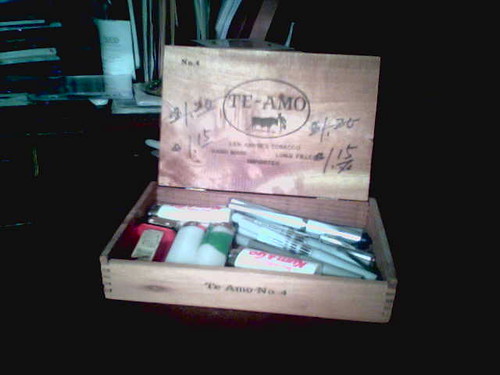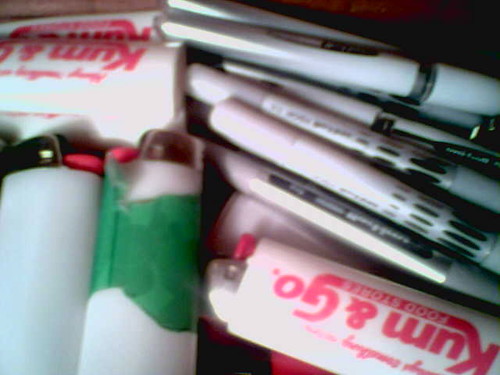“fl° – Trap Door (download here)
from International Psychedelic Mystery Mix
released by Dis-Joint (2006)
available via Turntable Lab
(file expires September 19th)
Like many of the mixes my friend Joey has turned me onto, Trap Door’s International Psychedelic Mystery Mix has no track list — just beautifully lettered album art and, in iTunes, cryptic ASCII symbols. Much of the material feels like it could be drawn from the distant corners of Alan and Richard Bishop’s Sublime Frequencies project and carries much the same message: that people plug in, freak out, and fall down across whole small world after all.
The lack of performance information triggers all kinds of alarms in my brain’s obsessive quadrants: how can I understand something if I don’t even know what to call it? Regardless of how I feel about a crossing it, I think there’s an unquestionable line between liberating the content of a piece of music via mp3s (“I’m gonna copy this great, obscure song for all my friends”) and liberating the intellectual ownership of the work entirely (“I’m gonna deliberately not give credit to the person who wrote it, even though I know who he is”). These are not just samples, mind you, but entire songs.
Obviously, the tracklisting is absent for legal reasons. Still, it’s a big line to cross — obscuring intellectual property, I mean, not bootlegging, which is quite well-trodden — and crossing it can be oodles of fun. It is incredibly freeing as a listener. “fl°” is the first real song on the disc, and I’ve no idea where it’s from. It grooves like Jamaican dub, but the melody sounds positively West African (but, then, that guitar sounds a bit Middle Eastern).
Here, crossing that line is potentially terrifying. The exploration of music is a dialogue, the discovery of albums, bands, and songwriters naturally leading one to the discovery of related albums, bands, and songwriters. In that way, the Trap Door mix is seemingly a dead end in a hedge maze. Maybe that’s the trick: that they found an end at all. Of course, Google can help with the vocal cuts, but the instrumentals remain elusive. It’s either an end, or the music becomes the property of the curator, the only one with the key. None of this is to complain — I’ve been thoroughly digging the bejeezus out of this mix — just to wonder aloud about what it all means, maaaan.
Listening to the Mets on the radio is a crystalline connection to the old, weird New York, and not simply because it was something I did when I was a kid. It is filled with advertisements for steak houses (“just over the left field fence in Astoria!”) and camera stores (B & H, closed for Shabbos, though the voiceover dude is obviously goyim, and just says “Friday evenings and Saturdays”), of annoying pitchmen and annoying pitches. The Mets’ announcers still shill for sponsors, and often interrupt themselves mid-commentary to do so. It is a world where hipsters don’t exist, and Dwight Eisenhower might as well still be President, or even Calvin Coolidge. Ballgames — and, I assume, other sporting events — are one of the few things that traditional radio still does extraordinarily well. Web 2.0? Whatever. I’ll take pure AM gold from Shea.
I’m gonna be mostly off-grid this week. Regular posting will resume Monday the 11th. xoxo, jj.
o Trap Door’s International Psychedelic Mystery Mix is dope. (Turntable Labs has it.)
o Diplo’s podcasts are archived.
o David Yaffe’s “Tangled Up in Keys” is a few weeks old, but is interesting attempt at unpacking the whole Dylan/Alicia Keys thing. (Thanks, BoomSalon.)
o ‘zine-era information punks RE/Search are putting out a second volume to their awesome 1987 Pranks sourcebook, certainly one of the cooler college textbooks I ever had to purchase. (Thanx, BB.)
o The 5 Most Obviously Drug-Fueled TV Appearances Ever. Jah bless YouTube.
via David Jay Brown and Rebecca McClen Novick’s Voices from the Edge:
It just gave me a greater admiration for the incredible baroque possibilities of mentation. The mind is so incredibly weird. The whole process of going into coma was very interesting, too. It was a slow onset — it took about a week — and during this time I started feeling like the vegetable kingdom was speaking to me.
It was communicating in comic dialect in iambic pentameter. So there were these Italian accents and German accents, and it got to be this vast garbling. Potatoes and radishes and trees were all speaking to me. It was really strange. It finally just reached hysteria, and that’s when I passed out and woke up in the hospital.
The odds that a lighter or a pen might survive to its natural end — the diminishment of ink or fluid — are pretty slim. They get pilfered, left at bars, lost in couches. It’s no matter, they’re cheap. Empty, they are often scarred.



“NYC’s Like A Graveyard” – the Moldy Peaches (download here)
from The Moldy Peaches (2001)
released by Rough Trade (buy)
(file expires September 5th)
Like “I Don’t Wanna Leave You on the Farm,” the Moldy Peaches’ “NYC’s Like A Graveyard” might first be construed as a novelty anthem. And it kind of is. Certainly, the anti-folk Peaches — who wore bunny suits, among other costumes, during their performances — eventually broke up rather than trying to shrug off the stigma of humor.
I remember hearing this song everywhere during the summer of 2001. I think it got played between nearly every set at Wetlands, and RANA covered it once or twice. It made me buy the album, just before a solo road trip I took to New England during the first week of September. Driving through rolling green hills, none of the other songs on the album — all novelties (or at least mutants) — took, but “NYC’s Like A Graveyard” was every bit as good as I thought it was. The recording hisses, almost literally, between the abrasive guitar and crummy-sounding hi-hat. Listened to as a single, between songs by other artists, my ears cringe whenever “NYC’s Like A Graveyard” begins.
Then 9/11 happened, and the song twisted into vapor. It’s not that the Moldy Peaches were prophetic, like Dylan’s “High Water (For Charley Patton),” their song was just true. “NYC’s Like A Graveyard” is a utopian summer anthem (“all the rock stars double datin'”), and one of those random thoughts one has sometimes when looking at the skyline (“all the tombstones skyscrapin'”), but mostly it’s about being young in New York (“we’ve got it! we’ve got it!”). In that period of post-attack murmur, though, it went away, not censored so much as willed out of people’s minds. RANA certainly never covered it again. Five years later, the song now a playlist footnote, New York City has changed considerably, though it is still — among many other things — a graveyard.
“I Don’t Wanna Leave You on the Farm” – Ween (download here)
from 12 Golden Country Greats (1996)
released by Elektra (buy)
(file expires September 4th)
My friend Bubba Love once pointed out that — slowed and stripped down — Ween’s “I Don’t Wanna Leave You on the Farm” could be an Elliot Smith song. He’s totally right. Specifically, it’s the chorus: that mournful, mournful change and the lyrics themselves (“days go by and I’m still high,” “leaves fall to the ground, it’s a sound that reminds me of you”). Since then, I’ve wanted to hear it played that way. It’s completely typical Ween, able to set real emotion (there are days I can’t get enough of the chorus) inside this wholly absurd frame (Ween doing a country album to begin with) with self-consciously juvenile brushstrokes (“I’m alone… on the throne”). That’s pretty much Ween at their best.
The idea of playing with copyright — through mash-ups (musical, visual, or otherwise), pirating, mixes — occasionally seems the modern equivalent of psychedelics. Like LSD, which had been in circulation for two decades previous to the 1960s, the notion of reappropriation took some time to achieve critical cultural mass (and has been present, in some form, for all human history). There are people who exploit it on a strictly recreational level (such as downloading music), and those who have used it as a great springboard of creativity (such as turning that music into something new and redistributing it). Committing one of the latter acts, especially, one automatically enters into the dialogue, rearranging the symbols around himself. It is an instant ticket to the group mind. Mostly, playing with copyright makes one see the world differently, as something more malleable than it was moments earlier. Though maybe not as dangerous an idea as acid, it still makes for a dandy of a bogeyman.
o Jonathan Lethem on Bob Dylan in the new Rolling Stone.
o Malcolm Gladwell on dependecy ratios in the new New Yorker
o Kevin Kelly’s newish Street Use blog, chronicling spontaneous technology.
o My dear friend DJ Power Possum/O’Diggity McPoindexter has begun marking Possum’s (totally bizarre) Travels.
o Sometimes, it’s really nice to read about the Beatles for no reason at all.




